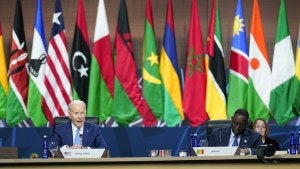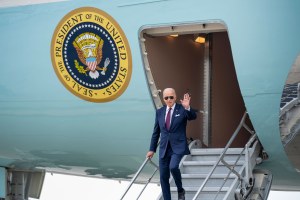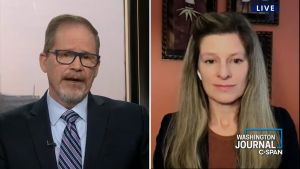For the first time, a majority of Republicans think the United States should stay out of world affairs.
The 2023 Chicago Council Survey, conducted September 7–18, 2023, finds evidence that US involvement in the war between Russia and Ukraine has played a role in American attitudes on foreign policy, from dampening public support for defending US allies and maintaining US military bases abroad to continued financial and military assistance to Kyiv. Along with the repercussions of the war for Americans’ worldview, the Republican leadership’s embrace of an “America-First” perspective to foreign policy seems to have also influenced GOP supporters’ ideas of how much the United States should participate on the global stage.
Key Findings
- About six in 10 Americans think the United States should play an active role in world affairs (57%, 42% stay out of world affairs). This reading reflects a steady decline since 2018 (when 70% favored an active role) and is among the lowest levels recorded since 1974.
- For the first time, a narrow majority of Republicans (53%) say the United States should stay out of world affairs rather than taking an active part (47%).
- At the same time, Americans continue to say that the benefits of maintaining the US role in the world (58%) are greater than the costs (41%), with majorities across partisan groups agreeing.
- As in past surveys, two-thirds prefer the United States take a shared leadership role (66%), compared to a dominant one (22%) or no leadership role (12%).
- Americans still see the United States as the most influential country among those included in the 2023 survey, assigning a rating of 8.4 out of 10 (with 10 meaning extremely influential). But they also see China catching up to US global influence.
- Majorities of six in 10 or more say it is most important for the United States to be a leader in economic (68%), human rights (65%), scientific and technological progress (62%), and military strength (60%).
- A narrow majority of Americans (52%) say the United States is the greatest country in the world, the lowest percentage in over a decade of Council polling on this question.
Support for International Engagement Shrinks over past Year
In a time-tested barometer of support for US engagement in the world, almost six in 10 (57%) Americans continue to say that it would be best for the future of the country to take an active part in world affairs. Four in 10 (42%) say it would be best to stay out of world affairs. While still a majority, the 2023 result continues a steady decline in support for international engagement in recent years and is among one of the lowest levels of support recorded in the 49-year history of the Chicago Council Survey.
These declines are evident across all partisan groups since 2020, but the drop is sharpest among Republicans. For the first time, a slim majority (53%) of GOP supporters now say the United States should stay out of world affairs, while slightly fewer say that the United States should play an active part (47%; see also Appendix Figure 1).
Republicans had been the strongest advocates of an active US international role until about 2014. Around the time of the Russian invasion of Ukraine in 2015, Democrats assumed this position as the strongest proponents of US engagement (70% active role this year, also down from an all-time high of 78% in 2020). At this point, the difference between Republicans and Democrats on this question is the largest it has ever been in Chicago Council Surveys dating back to 1974. Independents are also less likely to favor active engagement, with a slight majority saying the United States should actively participate in world affairs (53% active role vs. 46% stay out).
Most Americans Say Benefits of Maintaining US Global Role Worth the Costs
At the same time, a majority overall continue to say that the benefits of maintaining the US role in the world outweigh the costs (58% to 41%), similar to previous years. Partisan supporters have been stable on this question since 2021, when it was first asked. Today, two-thirds of Democrats (65%) and majorities of Republicans (55%) and Independents (53%) say the benefits of the US role in the world outweigh the costs to maintaining that role.
Most Remain Confident in US Ability to Manage Global Problems
While Americans are more hesitant now than in past surveys to back strong US engagement abroad, a majority (70%) express confidence in the United States’ ability to deal responsibly with world problems. This is largely unchanged from 2018, though down 11 percentage points from 2017. Changes since 2018 may be linked to which party controls the White House, as Republican confidence in the United States has declined just as Democratic confidence has risen (80%, up from 59% in 2018). And despite the drop among Republicans, two-thirds of GOP supporters still express confidence in the United States, as do 65 percent of Independents.
US Considered Most Influential Country, but China Narrowing the Gap
Americans still consider the United States the most influential country in the world (a mean rating of 8.4 out of 10), fairly close to recent readings (See Appendix Figure 2). But over the past six years, Americans have also steadily rated China’s influence as growing. Today, the gap between US and Chinese influence has narrowed to its closest point yet in the Chicago Council Survey: 0.9 points on a 10-point scale. Republicans and Democrats rate the United States similarly on this question, while Independents give a slightly lower mean score.
Shared Partnership Preferred
While the American public still sees their own country as having the most influence in the world, as in past surveys, they do not want the United States to manage global issues on their own. Broadly consistent with readings since the question was first asked in 2015, two-thirds endorse a shared leadership role for the United States (66%) rather than a dominant role (22%) or no role (12%, up slightly from 8% in 2021). In a similar pattern echoing past surveys, Republicans are substantially more likely than Democrats or Independents to favor a dominant role. And while only a small minority, the percentage who think the United States should play no leadership role has grown among Independents to its highest point at 16 percent and among Republicans to its highest point at 11 percent (See Appendix Figure 3).
Americans Prioritize Leading on Economic Strength, Human Rights, Science
Asked to choose in what areas the United States should be a world leader, the top response overall is economic strength (68%), followed by human rights (65%), science and technology (62%), and military strength (60%). There are some areas of bipartisan agreement. Similarly sized majorities of Republicans, Democrats and Independents all say that it is very important for the United States to be a world leader in economic strength and scientific and technological progress. And Americans across parties agree that on their lowest priority: artificial intelligence. Just a third of Americans overall (35%) and across party lines say this is a very important area for the United States to lead in.
Beyond these areas of agreement, there is far more divergence between the parties’ priorities. Republicans (82%) are far more likely than Democrats (49%) or Independents (55%) to emphasize military strength; in fact, more Republicans choose military strength than any other item presented. Republicans are also more likely to prioritize the United States being a leader in manufacturing (62%, vs. 44% Independents and 41% Democrats).
By contrast, Democrats are more likely to prioritize combating climate change (79%), human rights (78%), and democratic values (72%). Democrats are also distinctly more likely to say that it is very important for the United States to be a world leader in humanitarian assistance (56%, vs. 42% of Independents and 28% of Republicans). For their part, Independents are most concerned about economic strength (64%) and human rights (63%).
Steady Decline in Perception of the United States as the Greatest Country
Since Chicago Council Surveys first asked Americans whether the United States is the greatest country in the world because of its unique character in 2012, the percentage of those who believe it is the greatest has steadily declined, dropping to just 52 percent in the September survey. While many of the decreases on questions about the US role in the world are found among Republicans, on this question, the declines since 2012 have been steeper among Democrats and Independents.
In fact, Democrats are now more likely to say that the United States is no greater than other countries (55% vs. 44% greatest among Democrats), similar to opinions in 2019 and 2020. For their part, Independents are now equally divided (50% no greater vs. 45% the greatest). Three in four Republicans continue to say the United States is the greatest country, but this too is a mild decline from previous surveys.
Conclusion: What’s Driving Declines in Support for an Active Role among Republicans?
In the nearly 50 years of Chicago Council Surveys of Americans on foreign policy, shifts in the public’s desire for the United States to be engaged in the world are rare. The most major shifts have occurred as a results of events like the September 11 attacks or the prolonged recession in 1982. US involvement in the war in Ukraine has similarly impacted Americans’ appetite for global engagement. While fewer Americans across political party affiliations support the United States playing an active role in world affairs, the drop is especially prevalent among Republican Party supporters.
This drop among everyday Republicans likely reflects debates within the GOP leadership itself, which has become increasingly divided over continued assistance to Ukraine. That internal disagreement was on full display during the recent budget showdown on Capitol Hill. A vocal and growing group of Republicans criticized requests for continued funding to Ukraine because of costs to US households and because they feel the Biden administration is neglecting other issues they see as more critical to US security.
But the data show that Republicans who want to stay out of world affairs do not differ so much from those who prefer active engagement when it comes to issues such as the rise of China or immigration policy. Instead, the effects of the debate over US involvement in the war in Ukraine seem—thus far—to be limited to other questions about the US global military presence and the use of US troops in scenarios not involving top concerns for Republicans.
This analysis is based on data from the 2023 Chicago Council Survey of the American public on foreign policy, a project of the Lester Crown Center on US Foreign Policy. The 2023 Chicago Council Survey was conducted September 7-18, 2023 by Ipsos using its large-scale nationwide online research panel, KnowledgePanel, in both English and Spanish among a weighted national sample of 3,242 adults aged 18 or older living in all 50 US states and the District of Columbia. The margin of sampling error for the full sample is ±2.0 percentage points including a design effect of 1.2908. The margin of error is higher for partisan subgroups or for partial-sample items.
Partisan identification is based on how respondents answered a standard partisan self-identification question: “Generally speaking, do you think of yourself as a Republican, a Democrat, an Independent, or what?”
The 2023 Chicago Council Survey is made possible by the generous support of the Crown family, the Korea Foundation, and the United States-Japan Foundation.




Related Content
 Public Opinion
Public Opinion
Both Millennials and Gen Z are more hesitant than their elders to endorse military approaches to foreign policy.
 Global Politics
Global Politics
The West is failing to win over the Global South and the lack of support for the Ukraine war demonstrates why it matters.
 Public Opinion
Public Opinion
Most Americans see military power and security alliances as an effective way to achieve foreign policy goals, but differences emerge about when to deploy troops.



